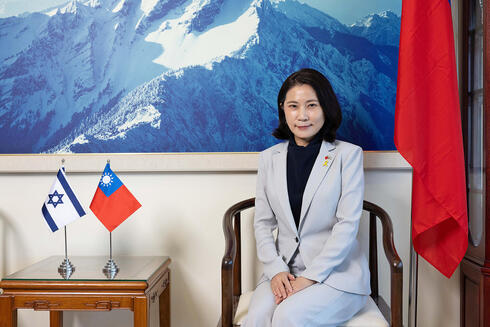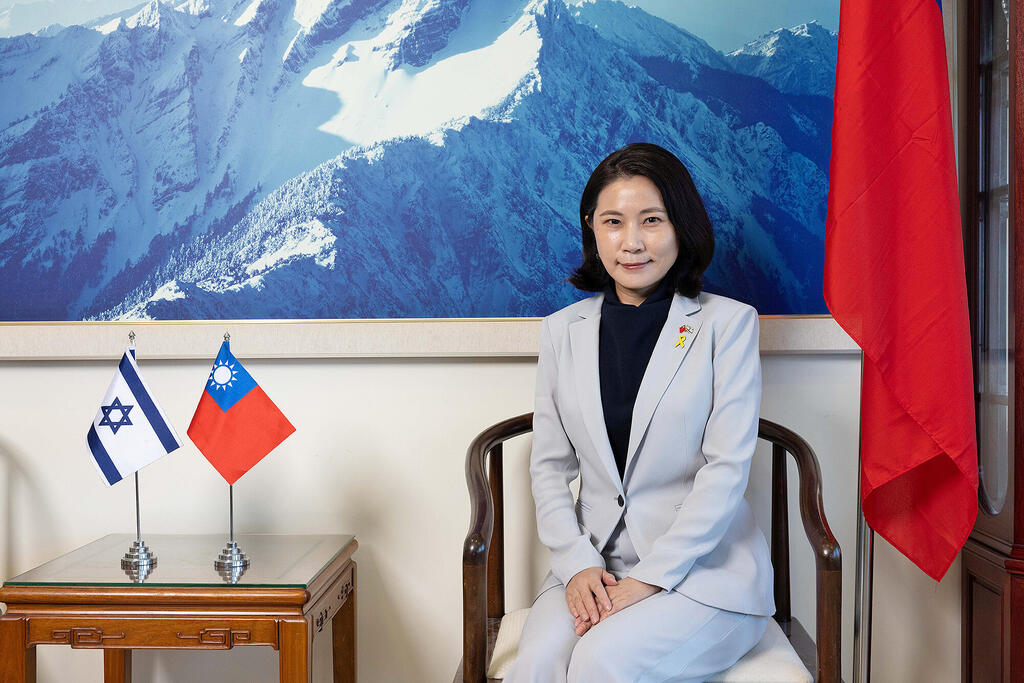
"Taiwan and Israel must defend themselves against aggressors"
"Both countries are at the forefront when it comes to the protection of democracy. Hamas, Hezbollah and Iran are attacking Israel. This is not a war between countries but a war between civilizations and ideologies," noted Ya-Ping (Abby) Lee, Representative at the Taipei Economic and Cultural Office in Tel Aviv.
Visitors to the Taipei Economic and Cultural Office in Tel Aviv, located on the 21st floor of the Azrieli Round Tower, are greeted by a cardboard figure of a Formosan black bear, the national animal of Taiwan. The name "Formosa," meaning "beautiful" in Portuguese, was given to the island by Portuguese explorers in the 16th century. Behind the bear and the name "Economic and Cultural Office" lies the de facto embassy and consulate of Taiwan. Taiwan has almost no official embassies worldwide due to China's refusal to recognize it as a sovereign country. For over 70 years, and increasingly in recent years, China has threatened Taiwan with invasion and annexation. As a result, countries wishing to maintain relations with China must carefully manage their relationships with Taiwan, leading to the creation of offices like the "Taipei Economic and Cultural Office."
The office in Israel has been led by Ya-Ping (Abby) Lee for two years, who must carefully navigate diplomatic actions not only due to the China-Taiwan situation but also because of the complexities of the Middle East.
The Taiwanese government expressed support for Israel after October 7, and also after the Iranian attack, and your office was involved in aid and donations to evacuees from the south and the north. Why does a country that is so far from Israel choose to take sides in our regional conflict?
"Even though we are not neighbors geographically, we share values. There are many similarities between Taiwan and Israel. Economically, Taiwan leads in hardware and Israel in software, we complement each other, and Taiwan is responsible for producing half of the AI chips in the world, so if we know how to cooperate we can lead the next AI revolution. Israel is perceived as a strong nation that faces difficult economic and security challenges, similar to Taiwan. Both countries are at the forefront when it comes to the protection of democracy. Hamas, Hezbollah and Iran are attacking Israel. We know that this is not a war between countries but a war between civilizations and ideologies. So we must have solidarity between the democratic countries that defend themselves against aggressors. The understanding that democracies must stand together against any aggressive country that tries to disrupt the world order is part of Taiwan's defense, along with strengthening our security capabilities and relations with the United States - similar to Israel, we buy most of our defense systems from the Americans."
You draw a picture where on one side are Taiwan, Israel and the United States. Who do you think is on the other side?
"We see evidence that the alliance between China, Russia, Iran and North Korea is tightening, especially after October 7. They share the same tactics and conduct, which uses both military force and cognitive warfare to instill in our society the fear that democracy does not work and only leads to chaos. In our view, the Russian invasion of Ukraine was a moment of awakening in many democracies in the world, including Taiwan."
What did you understand following the invasion of Ukraine?
"That we need to fortify our capability to defend ourselves, and that we need support and solidarity from other liberal democracies. We are working to make Taiwanese society more resilient and more adapted to the realities of modern warfare, and we strive to strengthen our relevance to other like-minded countries. We are trying to increase our relevance in science, technology and economy so that people all over the world know that Taiwan's security, prosperity and status quo will serve their interest.
"For example, the number one chip manufacturer in Taiwan, TSMC, is now investing about $66 billion in a chip factory in Arizona, the largest foreign investment in the United States, and is investing in a joint research and development center with Sony in Japan."
China expert Dr. Ori Sela told Calcalist in April that China uses Iran, but there is no alliance between them. Perhaps you are also describing countries that use similar tactics, but the relationship between them is actually not very tight.
"You can use the term group instead of allies. All the members of this group have great ambitions to change the world order. China's ambitions, for example, do not end with Taiwan, this is only the first stop. China also operates in the South China Sea and there are more and more disputes between it and the Philippines over this region. There are also disputes between it and Japan over the East China Sea. There is evidence that China is a significant source of financing for Iran, that it buys oil from it while there are economic sanctions against Iran. They provide military technology to Iran, some of the technology of the UAVs that Iran used against Israel originates from China." This week it was announced that Hamas also uses anti-tank missiles made in China.
Despite the similarity, the security threat to Israel does not only come from several fronts, it comes from terrorist organizations, while the pressure on you comes from a superpower. It's different, in all sorts of ways.
"True. Among other things, it is easier for terrorist organizations to attack without worrying too much about the consequences. China relies heavily on international trade and we are working to reduce its viability to attack us. From a military point of view, it is ready, from an economic point of view, it does not want to pay the price associated with such an attack."
And the expectation from Israel, beyond cooperation, is for similar support from our side in the event of such an attack?
"We believe that if we are in a situation similar to the one you are in, you will do the same for Taiwan. If there is a conflict in the Taiwan Strait, we do not expect Israel to fight on our side, but we expect support from you."
Is a Chinese invasion really in the cards? Is Taiwan a safe place?
"China's military threat to Taiwan is nothing new, it has been going on for decades. For example, when we had our first free elections, in 1996, China launched a missile test to scare the voters. But the threat has certainly intensified in recent years, especially in the combination of hybrid warfare. Taiwan provides more than 62% of the semiconductor chips in the world and more than 92% of the advanced ones, and if we look at the Taiwan Strait - this is an area where about 50% of the global maritime trade passes. So imagine what it means to undermine the security situation around Taiwan - war will lead to a huge blow to the global economy. If Taiwan's high-tech capabilities are damaged, the global GDP will lose $10 trillion, about 10%, according to a recent Bloomberg study. China will also have to pay a price, a third of its chips come from Taiwan and in the event of a war, China's GDP will shrink by 18%. And China understands this. That is why I do not think there is any current concern with visiting Taiwan, which is one of the safest destinations for Israeli tourists and Jews."
What does hybrid Chinese warfare mean?
"We have seen massive cyber attacks and cognitive warfare. In 2023, Taiwan suffered 5 million malicious cyber attacks every day, most of them from China. Every time there is an election, the Chinese try to interfere and manipulate the voters and the vote count. The communist regime is taking advantage of our freedom of speech, and we see it working to divide society, to sow hatred and chaos.
"Thus, cognitive warfare does not only include disinformation and fake news, but also the use of messages designed to harm democracy, spread hateful language, make people believe in extreme concepts and hate each other. This goes beyond polarization, it is mutual hatred. They are trying to create chaos within our society and they do this by trying to change public attitudes. For example, in China they talk about 'reunification' with Taiwan, but China never controlled Taiwan, so the 'reunification' is false, part of an attempt to mislead and make people believe that Taiwan is part of China."
So, what can we do against this? This happens in other countries as well.
"True, and we want to share our knowledge and experience, the ways to deal with it, because we do a relatively better job than others - because we are more careful. Since 2018, we have focused on increasing the media literacy of Taiwanese citizens: we remind people that they should be skeptical of information on the Internet and that they should fact check. We have organizations that deal with fake news, and there is a cyber security act that prohibits government agencies from using hardware, software or platforms that can be controlled by a foreign entity - so we do more prevention than other countries."
You have not blocked access to TikTok.
"The most controversial aspect about TikTok is technical — there is a backdoor where they can retrieve your personal information and your credit information or even snoop on you. The other thing is that TikTok manipulates the content that is shown. We see a lot of context-free videos designed to serve specific political agendas. A move designed to block it will provoke a long and complex discussion in Taiwan, because our people value freedom of expression very much. But TikTok is defined as malicious software in the cyber security law and is not installed on the phones of government employees, and we intend to expand the law and regulate the technology giants."
What moves might China make in Israel that are similar to what it is making against Taiwan?
"The Chinese may not directly influence your politics, and we have no unequivocal information about this, but they can sow fear of war, distrust of democracy and fear of relying on American support. And there are already reports that anti-Semitism in China is increasing, on social media and through it in society as a whole."
Should the growing Chinese involvement in Israeli infrastructure projects also worry us?
"Many countries have a dilemma whether to allow Chinese investments or let them physically build infrastructure. Risk management needs to be done. Does the infrastructure involve a security risk? If it's just construction, then I don't think there's anything to fear. On the other hand, the popularity of electric vehicles (EVs) is growing, and these are vehicles that are connected to all your electronic devices, including the phone, so in Taiwan, for example, pilots are not allowed to drive such vehicles. That is, if there is a security concern, at least from the government's point of view, we need to reduce our exposure."
So should I avoid Chinese vehicles and Huawei and Xiaomi phones?
"In your occupation, I would be careful."














